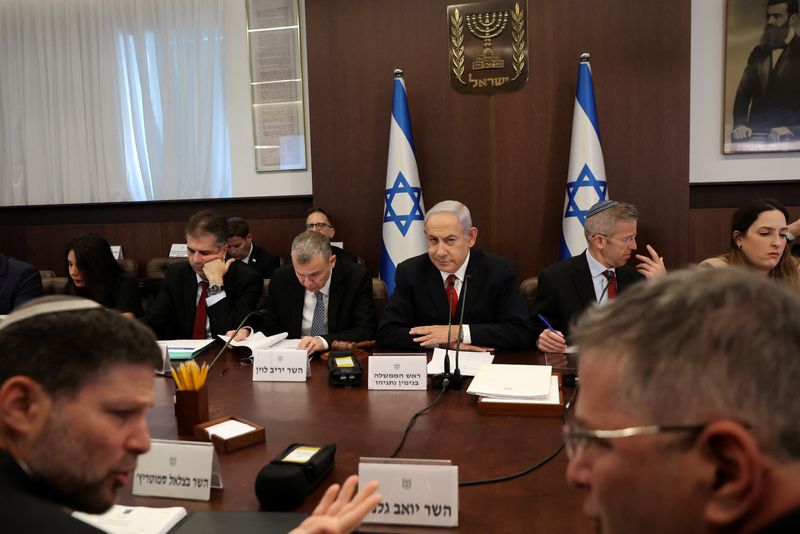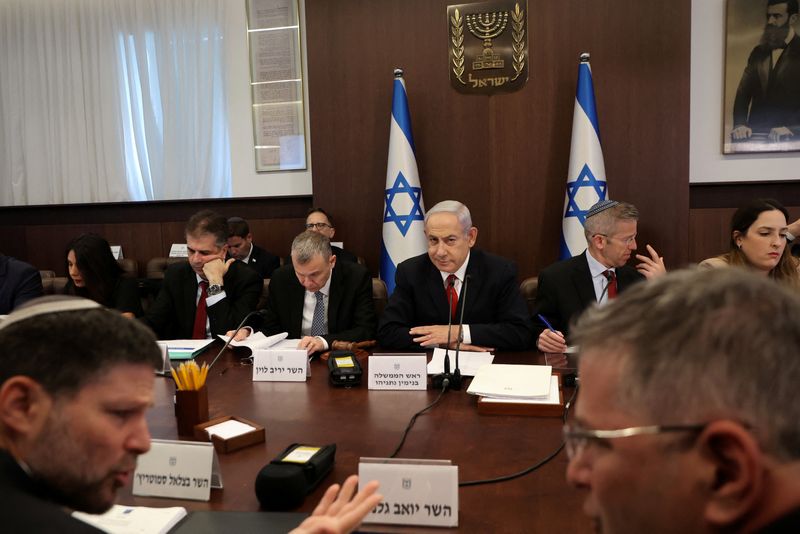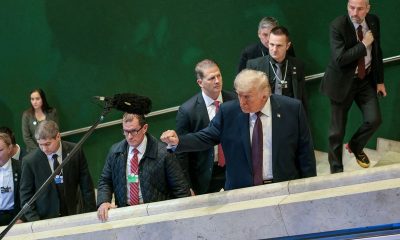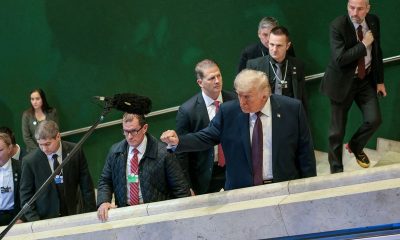Economy
Netanyahu bristles at protests as Israel’s judicial reform edges ahead


© Reuters. Israel’s Prime Minister Benjamin Netanyahu attends the weekly cabinet meeting in his office in Jerusalem on July 9, 2023. GIL COHEN-MAGEN/Pool via REUTERS
2/5
By Steven Scheer
JERUSALEM (Reuters) -Israeli Prime Minister Benjamin Netanyahu on Sunday summoned his attorney-general to explain the police’s handling of resurgent demonstrations against his plan to overhaul the justice system, as the reform bill edges ahead.
The bill that would limit “reasonableness” as a standard of judicial review – and which critics argue would open the door for abuses of power – is scheduled for the first of three ratification readings in parliament on Monday.
Critics say such reforms curb court independence. Netanyahu – who is on trial on graft charges he denies – says the aim is to restore balance among branches of government.
Compromise talks hosted by Israel’s president between the government and opposition stalled last month. Street protests that had subsided are flaring anew.
“An agreement is attainable. And yet, still no one is willing to sit down and talk, now, without preconditions. This is a blunder of historic proportions,” said President Isaac Herzog, whose post is largely ceremonial.
Protesters plan to converge on Israel’s main airport as parliament debates the “reasonableness” bill. A major mall chain announced a one-day shutdown if Monday’s vote passes.
In televised remarks before the cabinet session, Netanyahu said it was “unthinkable” that his religious-nationalist coalition would abridge the right to demonstrate or support any violence against protesters.
But he argued such freedom should not be extended to “violations of the law that harm the basic rights of millions of citizens and are taking place on an almost daily basis,” citing disruptions at Ben Gurion Airport, calls for disobedience within the military, main road closures and the heckling of elected officials.
He said Attorney-General Gali Baharav-Miara must “give an accounting” at Sunday’s cabinet. As the meeting began, Israeli media carried leaked quotes of some ministers calling for her to quit.
Baharav-Miara, according to a person briefed on the session, said she hoped the government was not asking her to say a more aggressive crackdown was needed even if it was inconsistent with the judgement of police commanders on the ground and prosecutors.
“I hope the government does not expect the law-enforcement apparatus to maintain ‘quotas’ of arrests or indictments of protesters,” she was quoted as saying.
Announcing the plan to shut all 24 of its malls on Tuesday, Big Shopping Centers called the “reasonableness” bill, if it passes its first reading, a “serious step on the way to clearly illegal governmental corruption, and another step on the way to dictatorship”.
“Such legislation would be a fatal blow to Israel’s business and economic certainty and would directly and immediately endanger our existence as a leading company in Israel,” it added in an open letter.
Shares of Big fell 3.1%. Cabinet minister Itamar Ben-Gvir said he would boycott Big unless it retracted what he deemed its politicised “bullying”.
The furore has dented the economy. TheMarker financial news site on Sunday estimated economic losses of some 150 billion shekels ($41 billion), citing weaker shares and the shekel, and higher inflation as a result of a more than 5% drop in the shekel versus the dollar that has helped fuel inflation and the cost of living.
($1 = 3.6951 shekels)
Economy
Russian central bank says it needs months to make sure CPI falling before rate cuts -RBC


© Reuters. Russian Central Bank Governor Elvira Nabiullina attends a news conference in Moscow, Russia June 14, 2019. REUTERS/Shamil Zhumatov/File Photo
MOSCOW (Reuters) – Russia’s central bank will need two to three months to make sure that inflation is steadily declining before taking any decision on interest rate cuts, the bank’s governor Elvira Nabiullina told RBC media on Sunday.
The central bank raised its key interest rate by 100 basis points to 16% earlier in December, hiking for the fifth consecutive meeting in response to stubborn inflation, and suggested that its tightening cycle was nearly over.
Nabiullina said it was not yet clear when exactly the regulator would start cutting rates, however.
“We really need to make sure that inflation is steadily decreasing, that these are not one-off factors that can affect the rate of price growth in a particular month,” she said.
Nabiullina said the bank was taking into account a wide range of indicators but primarily those that “characterize the stability of inflation”.
“This will take two or three months or more – it depends on how much the wide range of indicators that characterize sustainable inflation declines,” she said.
The bank will next convene to set its benchmark rate on Feb. 16.
The governor also said the bank should have started monetary policy tightening earlier than in July, when it embarked on the rate-hiking cycle.
Economy
China identifies second set of projects in $140 billion spending plan


© Reuters. FILE PHOTO: Workers walk past an under-construction area with completed office towers in the background, in Shenzhen’s Qianhai new district, Guangdong province, China August 25, 2023. REUTERS/David Kirton/File Photo
SHANGHAI (Reuters) – China’s top planning body said on Saturday it had identified a second batch of public investment projects, including flood control and disaster relief programmes, under a bond issuance and investment plan announced in October to boost the economy.
With the latest tranche, China has now earmarked more than 800 billion yuan of its 1 trillion yuan ($140 billion) in additional government bond issuance in the fourth quarter, as it focuses on fiscal steps to shore up the flagging economy.
The National Development and Reform Commission (NDRC) said in a statement on Saturday it had identified 9,600 projects with planned investment of more than 560 billion yuan.
China’s economy, the world’s second largest, is struggling to regain its footing post-COVID-19 as policymakers grapple with tepid consumer demand, weak exports, falling foreign investment and a deepening real estate crisis.
The 1 trillion yuan in additional bond issuance will widen China’s 2023 budget deficit ratio to around 3.8 percent from 3 percent, the state-run Xinhua news agency has said.
“Construction of the projects will improve China’s flood control system, emergency response mechanism and disaster relief capabilities, and better protect people’s lives and property, so it is very significant,” the NDRC said.
The agency said it will coordinate with other government bodies to make sure that funds are allocated speedily for investment and that high standards of quality are maintained in project construction.
($1 = 7.1315 renminbi)
Economy
Russian central bank says it needs months to make sure CPI falling before rate cuts -RBC


© Reuters. Russian Central Bank Governor Elvira Nabiullina attends a news conference in Moscow, Russia June 14, 2019. REUTERS/Shamil Zhumatov/File Photo
MOSCOW (Reuters) – Russia’s central bank will need two to three months to make sure that inflation is steadily declining before taking any decision on interest rate cuts, the bank’s governor Elvira Nabiullina told RBC media on Sunday.
The central bank raised its key interest rate by 100 basis points to 16% earlier in December, hiking for the fifth consecutive meeting in response to stubborn inflation, and suggested that its tightening cycle was nearly over.
Nabiullina said it was not yet clear when exactly the regulator would start cutting rates, however.
“We really need to make sure that inflation is steadily decreasing, that these are not one-off factors that can affect the rate of price growth in a particular month,” she said.
Nabiullina said the bank was taking into account a wide range of indicators but primarily those that “characterize the stability of inflation”.
“This will take two or three months or more – it depends on how much the wide range of indicators that characterize sustainable inflation declines,” she said.
The bank will next convene to set its benchmark rate on Feb. 16.
The governor also said the bank should have started monetary policy tightening earlier than in July, when it embarked on the rate-hiking cycle.

 Forex4 years ago
Forex4 years agoForex Today: the dollar is gaining strength amid gloomy sentiment at the start of the Fed’s week

 Forex3 years ago
Forex3 years agoUnbiased review of Pocket Option broker

 Forex3 years ago
Forex3 years agoDollar to pound sterling exchange rate today: Pound plummeted to its lowest since 1985

 Forex3 years ago
Forex3 years agoHow is the Australian dollar doing today?

 Cryptocurrency3 years ago
Cryptocurrency3 years agoWhat happened in the crypto market – current events today

 World3 years ago
World3 years agoWhy are modern video games an art form?

 Commodities3 years ago
Commodities3 years agoCopper continues to fall in price on expectations of lower demand in China

 Economy3 years ago
Economy3 years agoCrude oil tankers double in price due to EU anti-Russian sanctions

























